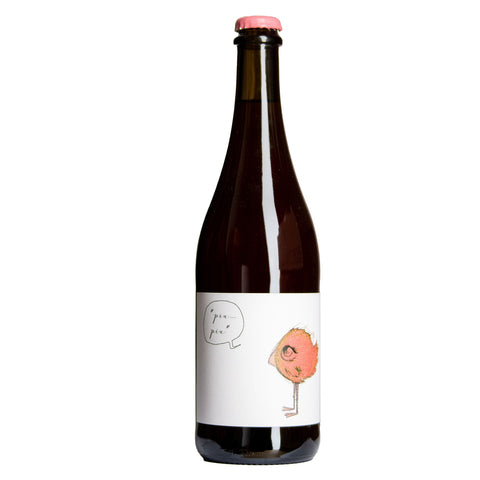
NV Fio Pet Nat Rosé "Piu Piu", Mosel, Germany
The bubbles of this Pet Nat are soft and fizzy. The wine shows fresh fruit and terrific concentration of the Pinot Noir used. Earthy fruit notes and a little yeast funk that is reminiscent to hops.
ABOUT THIS WINE
Pinot Noir from Mosel from multiple estate vineyards grown on slate soil. Native yeast and aged in a mix of Fuder and Doppelfuder from the 1940s & 1960s. S02 only used at bottling.
ABOUT THIS PRODUCER
The name Fio means ‘thread’ in Portuguese. The estate is a joint venture connecting two families: the Kettern family, who have been making wine in the Mosel for several hundred years, and the Niepoort family, led by famed Portuguese winemaker, Dirk Niepoort. Dirk is known for his different collaborations and works with winemakers across the globe. In addition to his travels in Spain, France, and Italy, he had traveled to the Mosel in his youth and befriended the late Wilhelm Haag, who passed away earlier this year. Wilhelm was an iconoclast and taught Dirk that “great wine didn’t have to be powerful and rich to be wonderful.”
Dirk and his sons Daniel and Marco had been searching for a project in the Mosel when they met Philipp Kettern of Lothar Kettern in Piesport. The two families shared a common vision for what the wines of the Mosel could be: old school wines made in a classic and slower style, using time as the element missing from many wines which they felt rushed to market today.
The wines are all grown on steep slopes in the villages of Piesport and Leiwen. It is not just cellar work that harkens back to a pre-modern mode, but viticulture too. No herbicides, pesticides, or chemical fertilizers are used. Sheep graze in the vineyards to control weeds and a hands-off approach is taken. Old vines, trained on single poles like the Douro or Côte Rotie, are prized and used not just for the top wines, but for all quality levels.
In the cellar, the wines are naturally fermented in very old Mosel fuder barrels and without sulfur. The ferments can take a long time to complete, but here, nothing is rushed. Most of the wines in the range are fermented completely dry and spend between one and three years in barrel, on the full lees before being bottled, unfined and unfiltered. SO2 is used at bottling and in low levels. The wines are released “when they start to taste really good” says Marco. This of course means that there are a variety of different vintages on release at any one time. “We admit we are not sales guys,” says Marco. “We want to taste and release the wines when they are ready, not before.”
The wines from Fio are certainly very different from much of what is made and currently imported from Germany, but they are also astonishingly delicious. These are “Natural” wines in the sense that they tick all the boxes (practicing organic viticulture, no SO2 during winemaking, minimal SO2 at bottling) with inventive, Daliesque labels. The quality of the wines is rooted in old vines, steep slopes, and great vineyard material from Göldtropfchen, Josephsberg, and Falkenberg, all top sites in Piesport. Fio is producing avant-garde wines without pretense for everyday drinking.
Details:
| Grape(s) | Pinot Noir |
| Farming | Organic |
